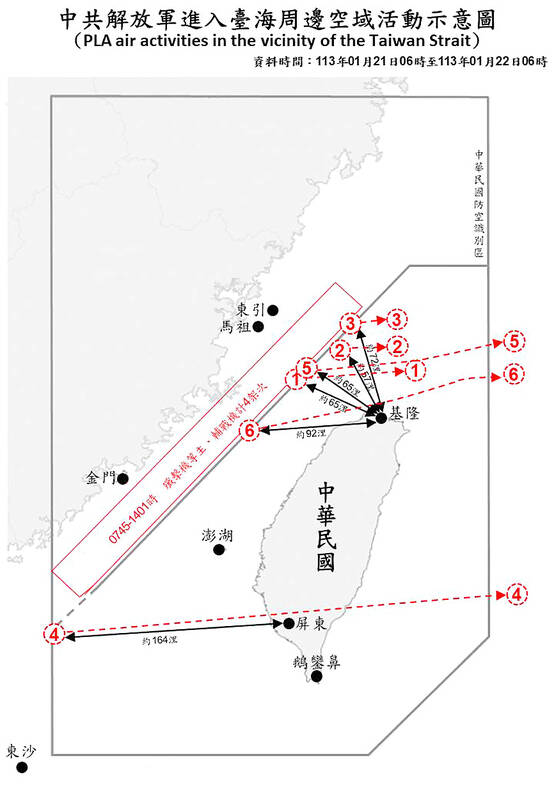The balloons that China has been floating over Taiwan are an attempt to determine the positioning of air defense units by luring them into opening fire, an academic said in a cross-strait situation brief published by the Mainland Affairs Council.
Balloons have limited ability to contribute to military operations, but are suited to “gray zone” tactics, said Lin Ying-yu (林穎佑), an assistant professor of international affairs and strategic studies at Tamkang University.
Although they lack offensive capabilities and cannot be steered, they are a symbol of Chinese state control and apply political pressure without being excessively provocative, Lin said.

Photo courtesy of the Ministry of National Defense
Taiwan’s armed forces have not shot down any of the balloons, despite having the capability, likely due to cost concerns, as air defense missiles are expensive, he said.
Beijing’s use of balloons in the winter — apparently to harness seasonal winds — serves a dual purpose of scientific research and intelligence gathering, he said.
Should Taiwanese units be provoked into firing at the balloons, Beijing would be able to glean valuable information about the position and operating procedures of launch sites to use in plans for a hypothetical invasion, Lin said.
Moreover, floating balloons over Taiwan proper is a symbolic display of China’s ability to exert air control that discredits the government in Taipei as being unable to mount an effective defense of its sovereign airspace, he said.
The use of balloons is concurrent with new developments in Chinese cognitive warfare techniques, which increasingly make use of propaganda videos that emphasize China’s military power while downplaying Taiwan’s, he said.
Taipei’s apparent inability to deal with the balloons was featured prominently in these videos, he added.
The use of balloons in Beijing’s harassment of Taiwanese airspace is mainly conducted for its political effect and not to gain a military advantage, Lin said.

Taipei has once again made it to the top 100 in Oxford Economics’ Global Cities Index 2025 report, moving up five places from last year to 60. The annual index, which was published last month, evaluated 1,000 of the most populated metropolises based on five indices — economics, human capital, quality of life, environment and governance. New York maintained its top spot this year, placing first in the economics index thanks to the strength of its vibrant financial industry and economic stability. Taipei ranked 263rd in economics, 44th in human capital, 15th in quality of life, 284th for environment and 75th in governance,

The Sports Administration yesterday demanded an apology from the national table tennis association for barring 17-year-old Yeh Yi-tian (葉伊恬) from competing in the upcoming World Table Tennis (WTT) United States Smash tournament in Las Vegas this July. The sports agency said in a statement that the Chinese Taipei Table Tennis Association (CTTTA) must explain to the public why it withdrew Yeh from the WTT tournament in Las Vegas. The sports agency said it contacted the association to express its disapproval of the decision-making process after receiving a complaint from Yeh’s coach, Chuang

Control Yuan Secretary-General Lee Chun-yi (李俊俋) tendered his resignation last night, admitting that he had misused a government vehicle, as reported by media. His resignation was immediately accepted by the Control Yuan. In a statement explaining why he had resigned, Lee apologized for using a Control Yuan vehicle to transport his dog to a pet grooming salon on May 20. The issue first came to light late last month, when TVBS News reported that Lee had instructed his driver to take the dog to the salon. The news channel broadcast photos that it said were taken by an unnamed whistle-blower, which purportedly showed the

Democratic Progressive Party caucus chief executive Rosalia Wu, front, grabs the pennant in a dragon boat race hosted by Qu Yuan Temple in the Shuanghsi River in Taipei’s Beitou District yesterday.